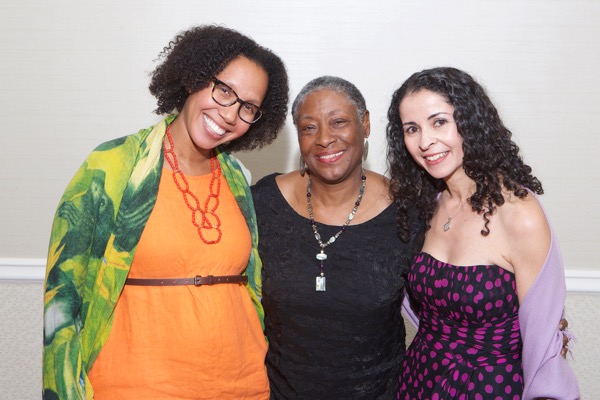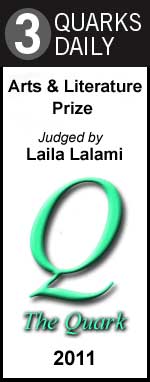Search Results for: finalist

I’m thrilled to report that The Moor’s Account has won the Hurston/Wright Legacy Award in fiction. I was not expecting the novel to take the prize—there were so many great books in consideration—but it was a special treat to see it being recognized at the Washington, DC gala. The other two finalists were Tiphanie Yanique (picture above, left) and Roxane Gay.
In other news, I had a new essay on the theme of ‘unforgettable meals’ in The New York Times Magazine this week. Here’s how it starts:
Moha, who wanted to be our guide, said it was an easy hike to the Bridge of God. But he looked about 15 and spoke in a timid voice that made me doubt how easy it would really be. We were at the trailhead in Akchour, a small village nestled in the Rif Mountains in northern Morocco. ‘‘How long will it take?’’ my daughter asked.
I translated her question into Arabic for Moha. ‘‘It depends how fast we walk,’’ he replied. ‘‘With small children, three or four hours.’’ The adults in our party were eager to do the hike; the children, not so much. Something is always lost in translation, but as Salman Rushdie once put it, something can also be gained. ‘‘Only a couple of hours,’’ I said in English.
You can read the rest here.
I’ll be closing my fall tour with an event in Santa Fe, New Mexico, where I’ll be in conversation with the novelist Aminatta Forna for the Lannan Foundation. Tickets for the event are available here.
(Photo credit: Don Baker / Hurston Wright Foundation.)
On April 16, the Pulitzer Prize Board announced that there were three finalists for the award in fiction, but no winner—a decision that sparked an outcry in some parts of the literary community. The three finalists were The Pale King, by David Foster Wallace; Swamplandia! by Karen Russell; and Train Dreams, by Denis Johnson. Each book had many vocal supporters, who were understandably upset at seeing their favorite be passed over—and not for another book, but for no book at all.
So the New York Times Magazine asked eight critics and writers, including me, to write about the books they would have chosen for the prize. You can read about our choices here. And you can chime in with your own here.

A few weeks ago, the editors of 3 Quarks Daily, the magazine of eclectic online writing, asked me to judge their Arts & Literature Prize. (The prize is in its second year and was judged last year by Robert Pinsky. Prizes have also been offered in the areas of Science, Philosophy, and Politics.)
Nominations for the 2011 Arts & Literature Prize were opened in mid-February, submitted to a vote, and winnowed down to nine finalists earlier this month.
I enjoyed reading the nine entries very much and appreciated especially the wide variety of subjects and genres: book reviews, personal essays, critical essays, an open letter, and a poem. There was a lot of very strong writing but, in the end, I had to choose just three for the prize. You can find out who they are here.
I don’t keep up with literary prizes, but I always look forward to the announcement of the IMPAC Dublin award, because the nominations come from libraries around the world; any book in any language is eligible so long as there is an English-language translation; and translators are recognized alongside the authors. This year’s shortlist has just been announced, and the finalists are:
The Speed of Light by Javier Cercas (translated from the Spanish by Anne McLean)
The Sweet and Simple Kind by Yasmine Gooneratne
De Niro’s Game by Rawi Hage
Dreams of Speaking by Gail Jones
Let it be Morning by Sayed Kashua (translated from the Hebrew by Miriam Schlesinger)
The Attack by Yasmina Khadra (translated from the French by John Cullen)
The Woman who Waited by Andrei Makine (translated from the French by Geoffrey Strachan)
Winterwood by Patrick McCabe
Notice that three Arab writers have made the cut (Rawi Hage, who is Lebanese; Yasmina Khadra who is Algerian; and Sayed Kashua who is Palestinian) but none of them write in Arabic. Hage lives in Canada and writes in English; Khadra lives in France and writes in French; and Kashua is a citizen of Israel and writes in Hebrew. So few Arabic novels are translated into English that when Arab writers are recognized in international awards, they tend to be those who write in other languages.
The judging panel includes Helon Habila, Patricia Duncker, Aamer Hussein, Eibhlín Evans, and Jose Luis de Juan, and the winner(s) will be announced June 12.

